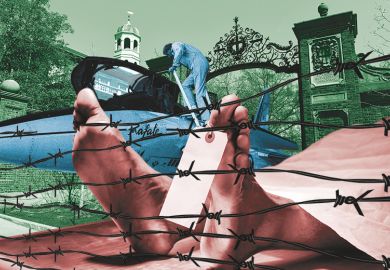Source: Alamy
French connection: Andrew Hussey, the centre’s director, will stay in Paris
Andrew Hussey may be fresh from research on radicalisation inside French prisons and planning a cultural history of heroin, but he has still found time to take over as the first director of the Centre for Post-Colonial Studies (CPCS).
Although Professor Hussey believes that no discipline is more important to the 21st century than postcolonial studies, he claims they have often been “too textual and too theorised”. As he takes over at the CPCS – part of the University of London’s School of Advanced Study – he is determined to “let research proceed out of experience, engagement, activity with people rather than imposing a template of theory”.
He also expects it to focus as much on popular culture such as North African raï music or even football as on the novelists who have often hitherto been central to postcolonial studies.
Dean of the University of London Institute in Paris (ULIP) since 2006, Professor Hussey has long practised what he preaches. His recent book The French Intifada: The Long War Between France and Its Arabs, for example, was published to great acclaim and debate earlier this year and included extensive research in French prisons, which he calls “the engine room of radicalisation”.
“The French authorities have been very welcoming”, he said, “because at the level of the [prison] directorates they know that things are going wrong and are interested in the British and Dutch model, and researchers like us who come from the outside have a certain carte blanche to construct our critiques.”
A current project, which sounds even more controversial, is to produce “a cultural history of heroin”, looking at its vast transnational links, for which he also hopes to seek the help of neuroscientists in “establishing what heroin does in the brain that produces an aesthetic which has defined a lot of the 20th century”.
The CPCS was launched at a British Council conference in Tunisia this month. Although Professor Hussey will remain in Paris, there will also be offices in London and in Rabat, Morocco. The journal he has taken over with him from ULIP, Francosphères, “seeks to define and question the presence of French language and culture across frontiers and borders”. While one postdoc is being taken on in December, he hopes to build up “a core group of between five and 10 people within three years moving between those hubs”.
Professor Hussey expects the new centre to concentrate initially on North Africa but to develop into “a kind of free-floating hub” that can range much more widely by joining forces with the SAS’ institutes of Latin American and Commonwealth studies as well as other components.
In the longer term, he hopes the centre can become a resource for “governments, diplomatic personnel, military personnel and the media” among whom he often sees “a massive ignorance of the movement of people going on throughout the world”.
Register to continue
Why register?
- Registration is free and only takes a moment
- Once registered, you can read 3 articles a month
- Sign up for our newsletter
Subscribe
Or subscribe for unlimited access to:
- Unlimited access to news, views, insights & reviews
- Digital editions
- Digital access to THE’s university and college rankings analysis
Already registered or a current subscriber? Login





